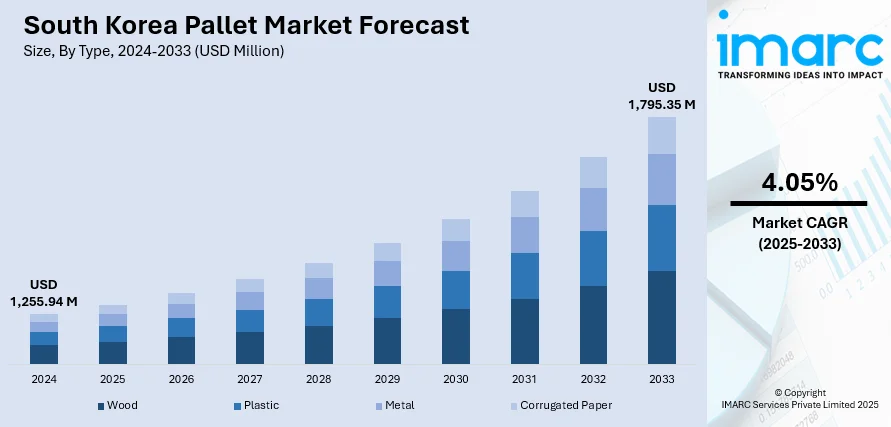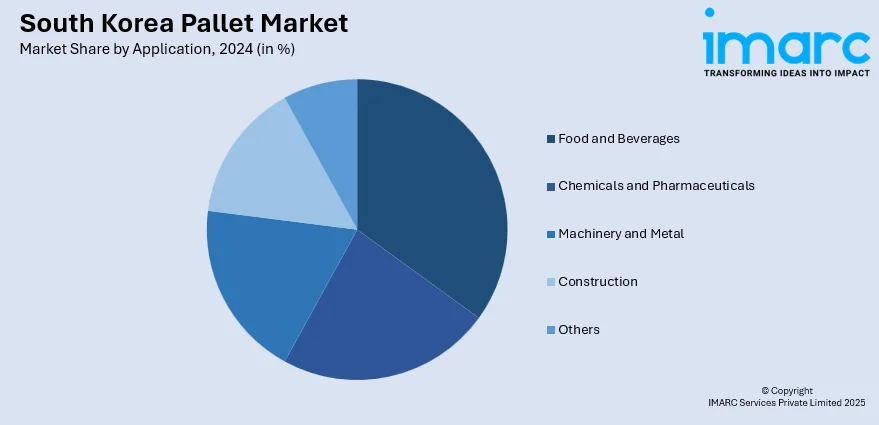
South Korea Pallet Market Size, Share, Trends and Forecast by Type, Application, Structural Design, and Region, 2025-2033
South Korea Pallet Market Overview:
The South Korea pallet market size reached USD 1,255.94 Million in 2024. Looking forward, IMARC Group expects the market to reach USD 1,795.35 Million by 2033, exhibiting a growth rate (CAGR) of 4.05% during 2025-2033. The market is driven by the accelerating automation within manufacturing and logistics, demanding highly durable, dimensionally consistent pallets compatible with AGVs and robotic systems. It is further propelled by stringent hygiene requirements, necessitating easily sanitized, non-porous materials to mitigate contamination risks. Concurrently, the pursuit of supply chain efficiency, cost predictability, and ESG compliance through circular pooling models is gaining significant traction, further augmenting the South Korea pallet market share.
|
Report Attribute
|
Key Statistics
|
|---|---|
|
Base Year
|
2024
|
|
Forecast Years
|
2025-2033
|
|
Historical Years
|
2019-2024
|
| Market Size in 2024 | USD 1,255.94 Million |
| Market Forecast in 2033 | USD 1,795.35 Million |
| Market Growth Rate 2025-2033 | 4.05% |
South Korea Pallet Market Trends:
Accelerating Shift Towards Plastic and Composite Pallets
The market is experiencing a pronounced shift away from traditional wood towards plastic and composite materials, driven by two primary forces: automation and stringent hygiene requirements. As South Korean manufacturing, distribution centers, and large retailers rapidly automate with AGVs (Automated Guided Vehicles) and robotic handling systems, the demand for highly durable, dimensionally consistent, and splinter-free pallets has increased. For instance, the government of South Korea has introduced the "4th Basic Plan on Intelligent Robots," which commenced in January 2024 with a budget of KRW 180 Billion (USD 128 Million). This initiative seeks to establish robotics as a fundamental catalyst for the Fourth Industrial Revolution. Korea is at the forefront of global robot adoption, enhancing a density of 1,012 units for every 10,000 manufacturing workers, with an annual growth rate of approximately 5% since 2018. This increase in automation is poised to revolutionize pallet handling and enhance logistics efficiency, thereby strengthening Korea's competitive edge in manufacturing and supply chain management. Plastic pallets excel in this environment, offering superior strength-to-weight ratios, resistance to impacts, and precise standardization critical for seamless automation integration. Concurrently, the growing hygiene standards, particularly in the pharmaceutical, food and beverage, and electronics sectors (influenced by both domestic regulations and global supply chain expectations post-pandemic), favor non-porous plastic pallets. These pallets are easily cleaned, sanitized, and resistant to moisture, pests, and bacterial growth, reducing contamination risks significantly. While cost remains a factor, the long-term benefits of reduced damage, lower maintenance, compliance assurance, and automation compatibility are compelling businesses to invest, fueling robust growth in this segment and prompting increased domestic production of specialized plastic pallets.

To get more information on this market, Request Sample
Growing Adoption of Pallet Pooling and Rental Services
The rise in the adoption of pallet pooling and rental services, moving beyond traditional ownership models is propelling the South Korea pallet market growth. This trend is fueled by the need for greater supply chain efficiency, cost reduction, and meeting corporate sustainability goals. Pallet pooling, where a third-party provider owns, maintains, and circulates standardized pallets among multiple users, eliminates the complexities and costs associated with pallet retrieval, reverse logistics, repair, and storage for individual companies. This is particularly attractive in South Korea's complex, high-volume export/import corridors and congested urban distribution networks. Companies benefit from predictable operating expenses (OPEX), reduced pallet loss, and guaranteed pallet availability without capital investment (CAPEX). Furthermore, pooling inherently promotes a circular economy model. Providers optimize pallet lifespan through professional repair and refurbishment, minimizing waste and raw material consumption. This aligns strongly with South Korea's stringent waste regulations like Extended Producer Responsibility - EPR and corporate ESG (Environmental, Social, Governance) commitments, making pooling an increasingly strategic choice for large retailers, manufacturers, and logistics providers seeking operational and environmental advantages.
South Korea Pallet Market Segmentation:
IMARC Group provides an analysis of the key trends in each segment of the market, along with forecasts at the country and regional levels for 2025-2033. Our report has categorized the market based on type, application, and structural design.
Type Insights:
- Wood
- Plastic
- Metal
- Corrugated Paper
The report has provided a detailed breakup and analysis of the market based on the type. This includes wood, plastic, metal, and corrugated paper.
Application Insights:

- Food and Beverages
- Chemicals and Pharmaceuticals
- Machinery and Metal
- Construction
- Others
A detailed breakup and analysis of the market based on the application has also been provided in the report. This includes food and beverages, chemicals and pharmaceuticals, machinery and metal, construction, and others.
Structural Design Insights:
- Block
- Stringer
- Others
The report has provided a detailed breakup and analysis of the market based on the structural design. This includes block, stringer, and others.
Regional Insights:
- Seoul Capital Area
- Yeongnam (Southeastern Region)
- Honam (Southwestern Region)
- Hoseo (Central Region)
- Others
The report has also provided a comprehensive analysis of all the major regional markets, which include Seoul Capital Area, Yeongnam (Southeastern Region), Honam (Southwestern Region), Hoseo (Central Region), and others.
Competitive Landscape:
The market research report has also provided a comprehensive analysis of the competitive landscape. Competitive analysis such as market structure, key player positioning, top winning strategies, competitive dashboard, and company evaluation quadrant has been covered in the report. Also, detailed profiles of all major companies have been provided.
South Korea Pallet Market News:
- August 7, 2025: Lotte Chilsung opened the nation's first complete automated multi-product order fulfillment center in Bupyeong, consolidating four facilities into an 8,300 m², 42-meter-tall building with a 9,000 pallet capacity. The facility, driven by Dematic's high-density AS/RS, Multishuttle, robot layer picking, and RapidPall palletizing cells, handles more than 1.2 million beverage cases annually. The system increases pallet storage efficiency, facilitates faster mixed-order fulfillment, lowers labor expenses, and offers real-time inventory tracking for the growing logistics business in South Korea.
South Korea Pallet Market Report Coverage:
| Report Features | Details |
|---|---|
| Base Year of the Analysis | 2024 |
| Historical Period | 2019-2024 |
| Forecast Period | 2025-2033 |
| Units | Million USD |
| Scope of the Report |
Exploration of Historical Trends and Market Outlook, Industry Catalysts and Challenges, Segment-Wise Historical and Future Market Assessment:
|
| Types Covered | Wood, Plastic, Metal, Corrugated Paper |
| Applications Covered | Food and Beverages, Chemicals and Pharmaceuticals, Machinery and Metal, Construction, Others |
| Structural Designs Covered | Block, Stringer, Others |
| Regions Covered | Seoul Capital Area, Yeongnam (Southeastern Region), Honam (Southwestern Region), Hoseo (Central Region), Others |
| Customization Scope | 10% Free Customization |
| Post-Sale Analyst Support | 10-12 Weeks |
| Delivery Format | PDF and Excel through Email (We can also provide the editable version of the report in PPT/Word format on special request) |
Key Questions Answered in This Report:
- How has the South Korea pallet market performed so far and how will it perform in the coming years?
- What is the breakup of the South Korea pallet market on the basis of type?
- What is the breakup of the South Korea pallet market on the basis of application?
- What is the breakup of the South Korea pallet market on the basis of structural design?
- What is the breakup of the South Korea pallet market on the basis of region?
- What are the various stages in the value chain of the South Korea pallet market?
- What are the key driving factors and challenges in the South Korea pallet market?
- What is the structure of the South Korea pallet market and who are the key players?
- What is the degree of competition in the South Korea pallet market?
Key Benefits for Stakeholders:
- IMARC’s industry report offers a comprehensive quantitative analysis of various market segments, historical and current market trends, market forecasts, and dynamics of the South Korea pallet market from 2019-2033.
- The research report provides the latest information on the market drivers, challenges, and opportunities in the South Korea pallet market.
- Porter's five forces analysis assist stakeholders in assessing the impact of new entrants, competitive rivalry, supplier power, buyer power, and the threat of substitution. It helps stakeholders to analyze the level of competition within the South Korea pallet industry and its attractiveness.
- Competitive landscape allows stakeholders to understand their competitive environment and provides an insight into the current positions of key players in the market.
Need more help?
- Speak to our experienced analysts for insights on the current market scenarios.
- Include additional segments and countries to customize the report as per your requirement.
- Gain an unparalleled competitive advantage in your domain by understanding how to utilize the report and positively impacting your operations and revenue.
- For further assistance, please connect with our analysts.
 Request Customization
Request Customization
 Speak to an Analyst
Speak to an Analyst
 Request Brochure
Request Brochure
 Inquire Before Buying
Inquire Before Buying




.webp)




.webp)












